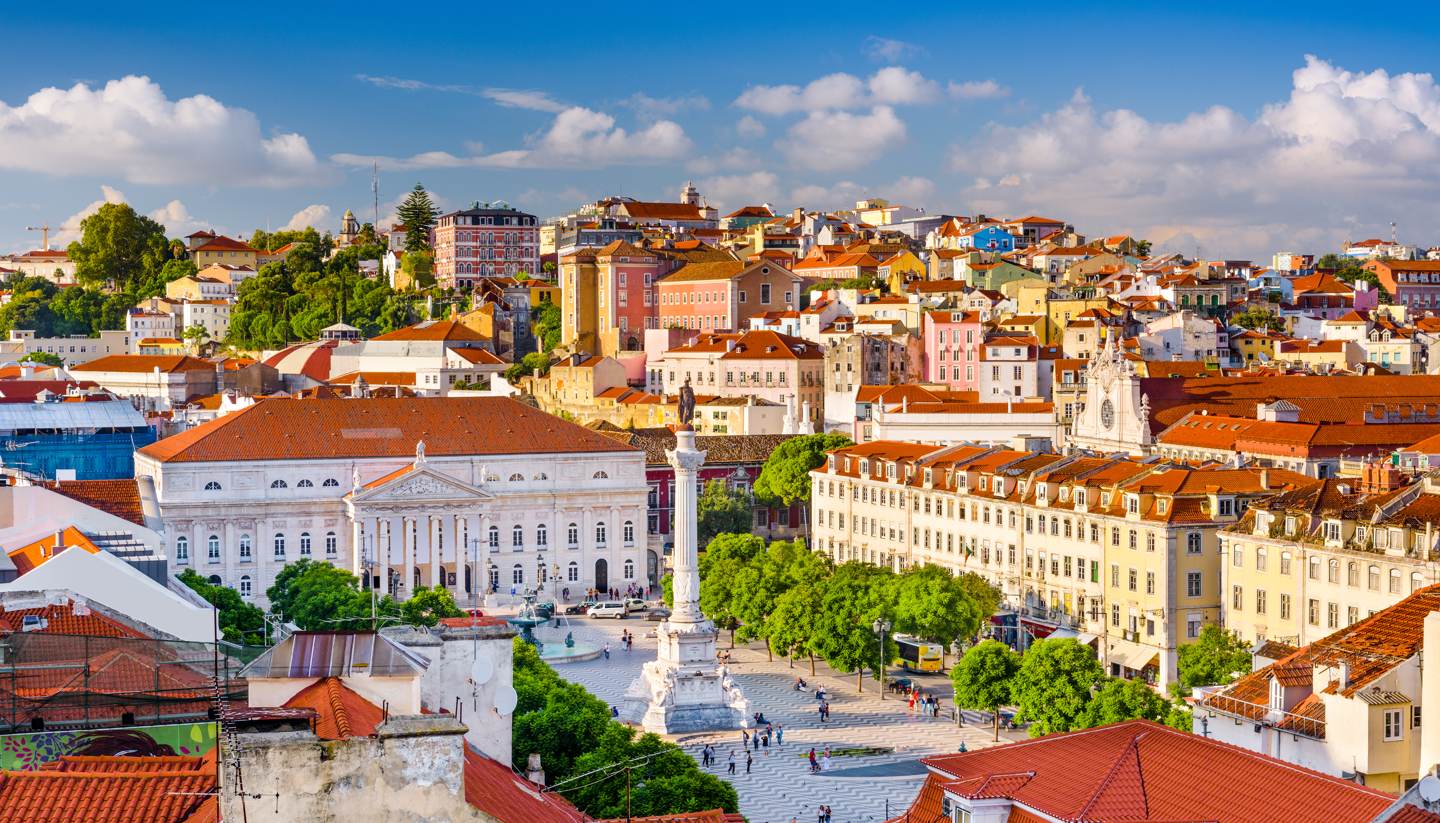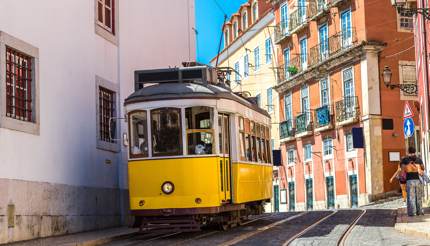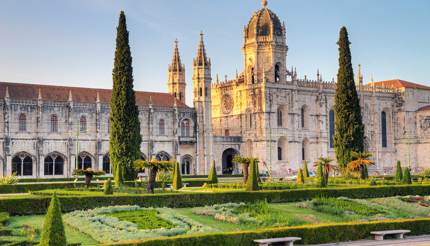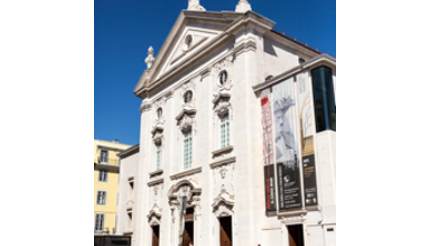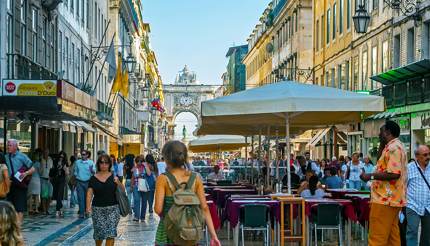With its colourful tiles, cobbled streets and crystal-clear skies, Portugal’s capital Lisbon enchants - and don’t forget to try its famous custard tart
Built on seven hills on the northern bank of the River Tagus, Lisbon’s beauty is surpassed only by its celebrated history. The second oldest capital in Europe, Lisbon was one of the world’s most significant ports during the Golden Age of Discovery when Portugal’s renowned empire extended from Brazil to India. Ever-evolving, it has today become a modern and cosmopolitan city, known for its friendly culture and superb cuisine.
When to go
Spring (March-May) is one of the best times to visit Lisbon; skies are clear and temperatures hover around 15-18ºC (59-64ºF). Accommodation and travel rates are low, and sightseeing crowds are thin. Bring a rain jacket especially if you visit in early spring.
Summer (June-August) is tourist season in Lisbon: expect high hotel rates and crowded beaches. At an average of 28ºC (82ºF) in July and August, Lisbon has the perfect sunbathing weather. The energetic street parties and barbecues of early June, when the country celebrates its saints, make for a fun time to visit.
Autumn (September-November) is a cheaper and less crowded season to experience the city. Although it isn’t beach weather, temperatures are still enjoyable, at times hitting 20ºC (68ºF).
Winter (December-February) in Lisbon is mild, with temperatures around 15ºC (59ºF), but the weather can be quite grey and rainy. If you don’t mind packing your rain boots, this is a great time for travel deals.
Getting around
Lisbon has an efficient public transportation system. The metro has four lines running every three to ten minutes in addition to a network of buses, trams, funiculars and street lifts. Single tickets, day passes, or reloadable cards can be used for travel, while the Lisboa Card tourist pass offers unlimited public transportation access for 24, 48, or 72 hours.
For information on the best ways to explore Lisbon, see our Getting around Lisbon guide.
Must-see attractions
Castelo de São Jorge (Castle of St George)
From atop the highest of Lisbon’s seven hills, the Castle of St George surveys the historic city centre below. Until the 15th century, this castle was the royal residence. Today, it attracts thousands with its gorgeous gardens and the view from its ramparts.
Jerónimos Monastery
Portugal’s illustrious past as a wealthy leader in the Age of Discovery lives on in the form of this 16th-century monastery. With fabulous arched ceiling and ornate windows, it is one of the few surviving examples of the medieval Manueline architecture.
Rua Augusta Arch
History in Lisbon is often split between the years before and after the devastating 1755 earthquake. The triumphal Rue Augusta Arch was built to celebrate the city’s reconstruction. Visitors today can take a lift to the top for striking views over the city.
For more top tourist attractions, check out our Things to see in Lisbon guide.
Quirky & offbeat
Money Museum
Interactive exhibits track the history and evolution of money and its relationship with Portuguese society and the wider world. And the best part is admission is free!
The Doll Hospital
The Doll Hospital has been lovingly restoring broken toys since the 1830s. Arms, legs, heads, and torsos fill glass cabinets and slump naked on tables. If the dolls’ shattered limbs freak you out, definitely don’t look them in the eyes.
For more quirky things to do, check out our Things to do in Lisbon guide.
Must-try specialities
- Bacalhau – salted cod, often eaten with scrambled eggs, olives, onions, and fried potatoes
- Lulas recheadas a lisbonense – stuffed squid
- Pasteis de nata – these famous egg custard-filled tarts originate from Lisbon
- Fresh sardines – served grilled and juicy, traditionally eaten in June during the Fest de Santo Antonio
- Bifana – sandwich with thin slices of fried pork, a popular street food
- Port – Portugal’s most famous alcoholic beverage
Check out our Lisbon Food & Drink Guide: Top 10 things to try in Lisbon, Portugal for more delicious, must-try food and drink.
Tipping: A 10-15% tip is customary, as service charges are usually not included in hotel and restaurant bills.
Hotels in Lisbon
Lisbon has accommodations to suit every type of traveller. High rollers will savour hotels near the Avenida da Liberdade, which has international chains as well as elegant independent hotels, like the Feng Shui-designed Inspira Santa Marta. Affordable lodgings in the city centre, such as the Residencial Florescente, also exist. Quieter accommodation can be found in western Lisbon or the district of Belém.
For more hotel recommendations, see our Lisbon Hotels guide.
Nightlife in Lisbon
Lisbon knows how to have fun. Numerous bars, clubs, and discos centre themselves within the Bairro Alto district. Here you’ll find a range of offerings such as the bluesy Café-Bar BA and the electro vibe of Lounge. If Fado, the haunting music of Lisbon, is the ambience you crave, check out Senhor Vinho in the quieter Lapa Quarter.
For more recommendations on bars and live music, check out our Lisbon Nightlife guide.
Shopping in Lisbon
Avenida da Liberdade and the Chiado is your best bet if you’re looking for designer shopping in Lisbon. Bargain hunters will rejoice over the Feira da Ladra flea market, with its eclectic offerings of clothes, antiques and kitchenware. There are also plenty of shopping centres if you’re up for some heavy-duty retail therapy; check out Centro Colombo or Amoreiras Shopping Centre.
Take a look at our Shopping in Lisbon guide for the more places to shop in the city.
Visa requirements to Lisbon, Portugal
Nationals of the USA, Canada and Australia can enter Portugal without a visa for up to 90 days. They must bring with them a passport valid for three months beyond their length of stay. EU including UK nationals may enter with a national ID card or passport valid for the proposed duration of their visit. For a stay longer than three months, EU nationals must register with local authorities.
For more information, visit our Portugal Visa and Passport Requirements page.
Before you go, check out:
